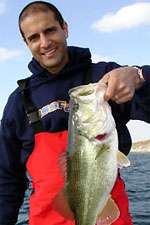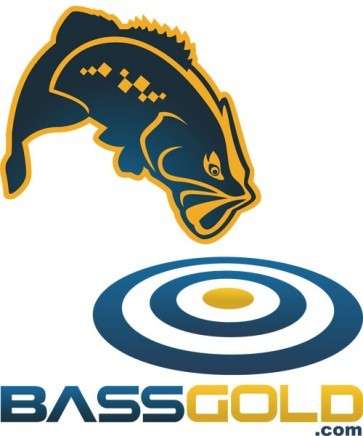
What if someone told you before last year’s Bassmaster Classic we had a tool that would predict the exact Classic-winning pattern – and weight? And not only that, this tool would do the exact same thing for every Elite Series event that year?
I’m sure you’d tell the guy to stop licking toads and get some help…but this really happened.
The tool, or really a web-based app, is BassGold , which you hopefully have heard of by now (full disclosure: I developed it). If not, the short version is this: At BassGold’s core is a constantly growing database of thousands of tournament patterns covering hundreds of waters.
BassGold launched in partnership with B.A.S.S. at last year’s Classic on the Red River, where it correctly predicted the winning pattern (including the pools and baits), and Chris Lane’s winning weight within 6 ounces. Then it was a pretty darn incredible 92 percent accurate over all the 2012 Elite events in predicting winning and placing (second-fifth) patterns and weights.
Dialing In To the Classic Pattern
That’s impressive, but BassGold isn’t a magic bullet – not always, anyway. It’s closest to a magic bullet when it has data on a particular water body and similar water types (upland reservoir, lowland reservoir, natural lake, etc.) for the time of year you’re interested in.
But when it comes to things like tournaments held in February on Grand Lake, there’s little pattern info specific to that situation – because hardly any events have been held there at that time.
So to use BassGold to predict this year’s Classic-winning pattern, we first have to take a look at pattern information for months around February. We’ll start with March, for which BassGold has plenty of info.
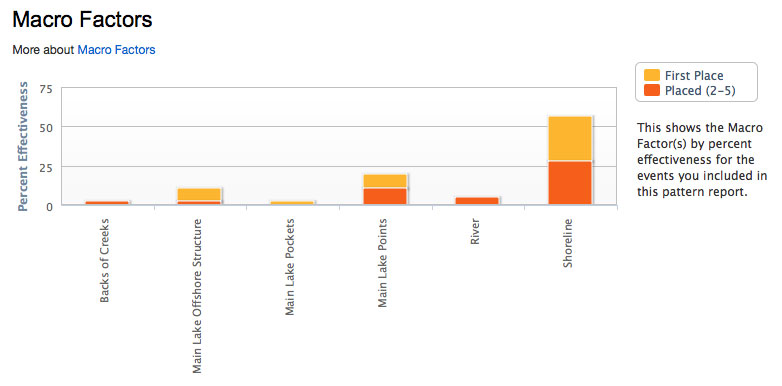
The “Pattern Report” graph shows that more than 50 percent of anglers who win or place high (second-fifth) in March tournaments fish the shoreline. Cover-wise, its rock to win and wood to place. And for baits, spinnerbaits account for most wins (40 percent), jerkbaits are second-most-effective, and jigs third.
(Tommy Biffle, one of the local favorites to win the Classic, said without seeing the BassGold data: “A Rogue bite, a jig bite, a spinnerbait bite – that’s how it’ll be won.”)
Worth noting is if you add in Grand patterns from November – which include a few ice-bowls – “shoreline” still dominates. Rock and wood become equally important for wins, but wood still dominates for second-fifth finishes. Spinnerbaits are still No. 1 though jigs and jerkbaits switch places. Crankbaits also come on stronger.
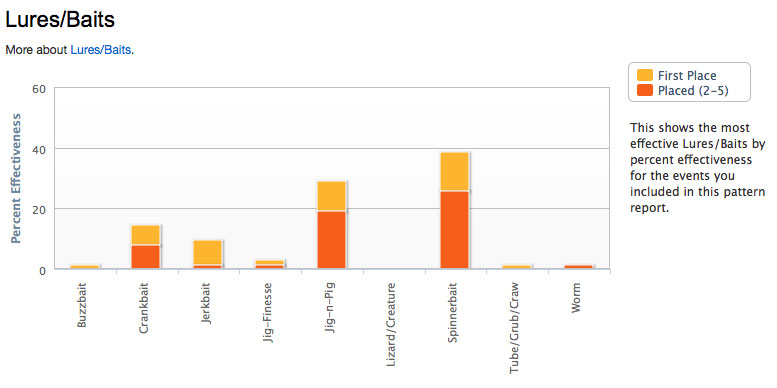
The applicability of either winter or March pattern info will be determined by the exact conditions at tournament time. If the lake is warmish, look for a shallower bite, though fish can still be caught deep. As Open qualifier and for-sure local favorite Jason Christie says, “The water temperature that time of year can be anywhere from 37 degrees to 50 degrees, and there’s 15 different patterns in that span of temperature.”
That means if it’s super cold, fish will be deeper – but again, there’s always some shallow fish at Grand. Mark Zona discovered that when filming an episode of his show there in the winter: “BassGold knowing they bite shallow at that time of year is dead on,” he says. “Those fish act way more northern than southern.”
Knowing that is important because it’s counterintuitive. In other words, BassGold doesn’t show us what we think will work or “should” work. It shows us what has definitely worked. In fact, if Grand is cold for the Classic, the bass might be shallower than you’d think, just on a different bite (like jerkbaits vs. spinnerbaits).
Classic Weight and the ‘Elite Factor’
Common sense tells us if it’s a warmer Classic, weights will be higher than normal and vice versa. Is that what the BassGold data indicates?
In a way. If you look at a “Weights By Month” graph for average winning and placing weights on Grand in March, you see a wide range, from less than 10 pounds per day to 25. But winning weights cluster around the low 20s per day to win, with placing weights in the high teens.
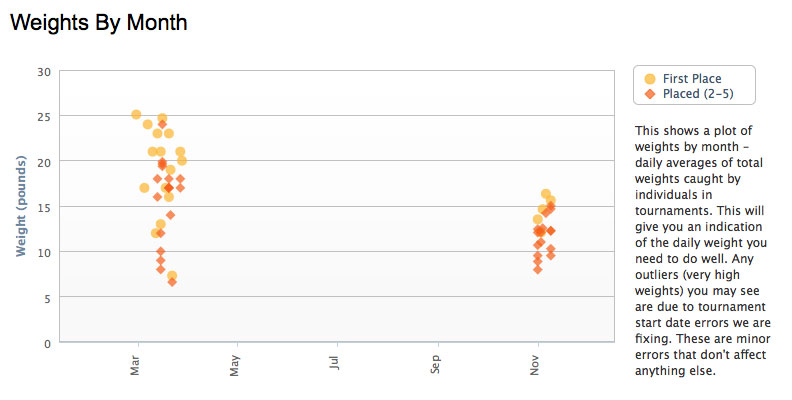
If Grand has a cold winter, could that weight be lower? Possibly: The November weight range is low- to mid-teens.
But don’t forget the “Elite Factor.” In other words, these guys are such great fishermen they often have higher-than-average weights – particularly the winners, who also often catch the winning fish doing something different than most fisherman on a particular water body have done.
Anglers To Watch
Picking anglers who should do well in any event is an educated guess that can depend on many different factors. In this case, we’ll pick five using what BassGold tells us.
Jason Christie is first on the list. He definitely knows the lake, and if you scroll down the list of March patterns in BassGold he is the only Classic competitor to show up – three times, for consecutive mid-March BFL wins (2006-08).
“BassGold’s guess is as good as mine for the amount of time I’ve had on the water in February at Grand,” he says. “I really don’t know what to expect. Most of the guys who fish there tend to fish shallow, but there definitely will be some fish deep.”
Next on the list is Brent Chapman, about to fish his first season as the reigning Toyota Tundra Bassmaster Angler of the Year. Brent grew up in Kansas, but in his formative years spent a lot of time fishing upland reservoirs in Oklahoma and Missouri. “I’ve spent a lot of time at Grand, but not in February,” he says.
He feels “great” about the Classic, and one reason for that is a lot of practice – on other upland reservoirs. “I’ve fished Lake of the Ozarks and Table Rock in February, and my home lake (Quivera, in Kansas), and they all fish fairly similarly. So I have a pretty good idea of what I’m doing and what I need to look for.”
In other words, he knows what BassGold shows to be true: waters of the same type, even far apart, fish very similarly, and he’s counting on that to help him in the world’s most important fishing tournament.
Aaron Martens, arguably the best fisherman never to have won a Classic, is next. He thinks fish will be deep “and probably on the bank too. If you can figure out both [patterns], that’s the ideal situation.”
Edwin Evers – another semi-local favorite also due for a Classic win – feels the same way about it: “If we’ve had a normal, cold winter, I think it’s going to be a matter of just trying to get some bites” whether shallow or deep. He’s scouted the lake extensively and says, “If I get something going, I’ll be able to duplicate it all over the lake.”
Lots more anglers could be on this list – like Mike McLelland, whom Zona notes is a jerkbait master, and Tommy Biffle, who has a little-known jerkbait-filled past on Grand. But we just can’t leave out Kevin VanDam. Why? How about three Top 10s, including two wins, in the last five Classics. And one was a third-place finish on an upland reservoir, Georgia’s Lake Hartwell.
Even though “Grand Lake is extremely diverse even from one end to the other,” he says, bass “don’t ever get real deep there. But the big variable is going to be what happens in the 14 days before the Classic. That’s the thing, paying close attention to the weather and water conditions.”
—–
Check out BassGold.com – it’s a B.A.S.S. partner for a reason: It really works! Right now B.A.S.S. members can save 15 percent on a one-year subscription price. Just use code BASS132 (case sensitive) when you sign up. Don’t forget to use the code! Note that BassGold offers a three-day free trial.

